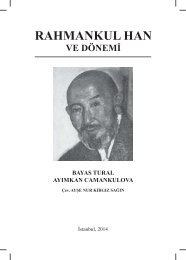THE SOVIET HISTORIOGRAPHY AND THE QUESTION OF KAZAKHSTAN’S HISTORY
SOVYET-TARIH-YAZICILIGI-ENG
SOVYET-TARIH-YAZICILIGI-ENG
Create successful ePaper yourself
Turn your PDF publications into a flip-book with our unique Google optimized e-Paper software.
<strong>THE</strong> <strong>QUESTION</strong> <strong>OF</strong> <strong>KAZAKHSTAN’S</strong> <strong>HISTORY</strong> 43<br />
matchless treasure for a historian. 51<br />
Among scholars who commented, the philologist S. Amanzholov<br />
explained a historian’s usage of folklore materials: “Our historians and<br />
literati have to clarify their interest in folklore materials and poets of the<br />
court. Every Sultan and Khan used court poets who glorified their work,<br />
so that their Khanate would be remembered in the future. Such poets<br />
are mostly ideologues of a certain class. For example, Buxar in Abylai<br />
Khan’s era, or Nysanbai in Kenesary’s era.” 52 He stated that Bekmakhanov<br />
used the poet Nysanbai in his work about Kenesary. B. Suleimanov also<br />
commented about this topic. In response, Bekmakhanov said that “Not<br />
only Kazakhstan’s, also other peoples’ past was written in historical<br />
travel-books and officers’ memoirs, tradesmen, and other ruling class<br />
representatives too. We can have information about the past events,<br />
through those sources. Why we should throw them into a dustbin? Your<br />
words make no sense because, if you cannot interpret what a source is.<br />
you cannot approach to those sources in a scientific way.” 53<br />
The third major accusation against Bekmakhanov was how he<br />
portrayed Kenesary’s personality. Among the topics discussed was<br />
that Kenesary descended from Genghis Khan, his fought against the<br />
Great Russian nation, he was a reactionary, and the aim of his uprising<br />
was examined too. On this topic, many famous historians spoke and<br />
expressed their opinions. Despite these well-known Russian historians<br />
who supported Bekmakhanov, in that era of Bolshevik domination, it<br />
was impossible for Bekmakhanov to exculpate Kenesary.<br />
Finally, they allowed the accused Bekmakhanov the chance to speak.<br />
The historian claimed that his critics and others with opposing arguments<br />
relied on the tactic of “Giving irrelevant footnotes from Marxism-Leninism<br />
classics and failing to associate them with historical events”. The<br />
historian expressed his opinions clearly by saying: “I pointed out that<br />
Kazakhs had their own state and also the fact that my nation exists.”<br />
Despite all of this, the discussions were inconclusive, although<br />
the consequences became clearer shortly thereafter. In fact, during<br />
this meeting, an underlining sentiment formed to fault Bekmakhanov.<br />
It was already clear that he was going to be politically prosecuted.<br />
In 1950, prosecution of E. Bekmakhanov gained a new role. On 26<br />
December, “Pravda” publish an article, which was written by Shoynbaev,<br />
Aidarova, Yakunin, et.al, and titled “Examining issues of the History<br />
51 Bekmakhanov, E. Qazaqstan XIX gasırdın 20-40 jıldarında (Oku quralı), Almatı: “Sanat”,<br />
1994, pp. 42-43.<br />
52 Bekmakhanov, Jeti tomdık şıgarmalar jinagı, p. 217.<br />
53 Bekmakhanov, Jeti tomdık şıgarmalar jinagı, p. 316.



